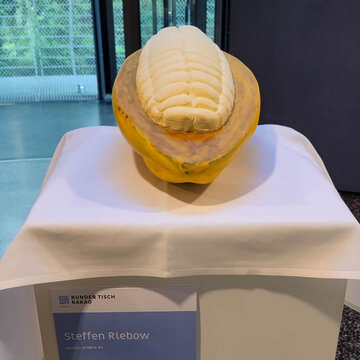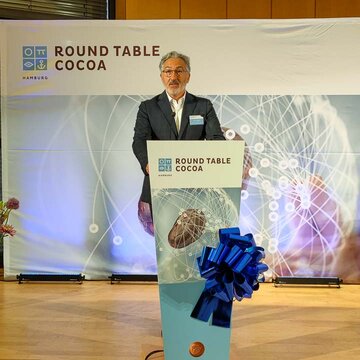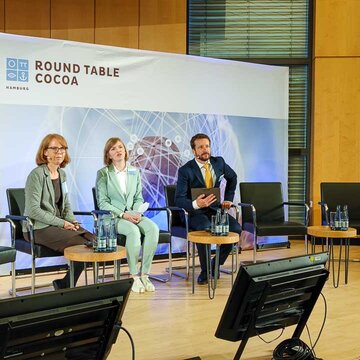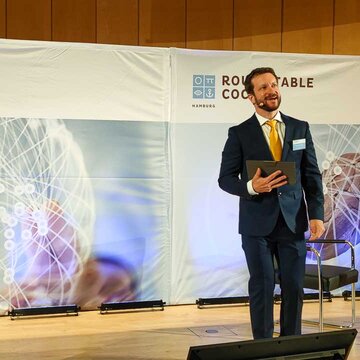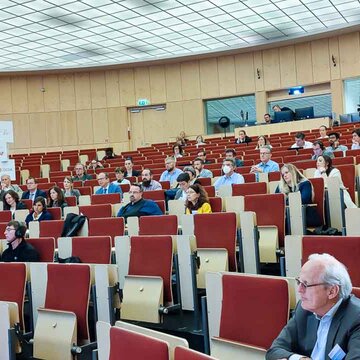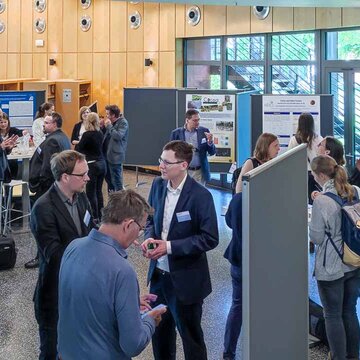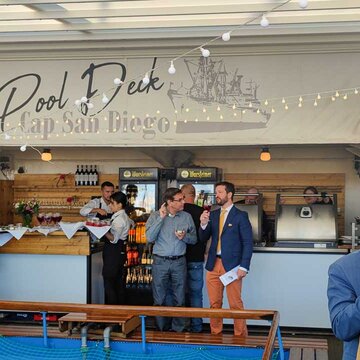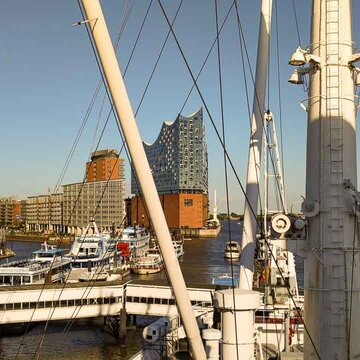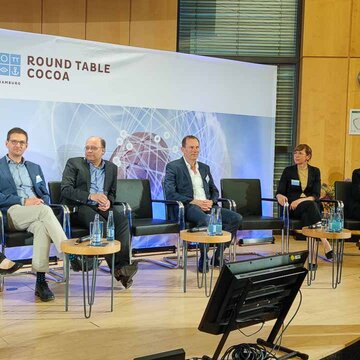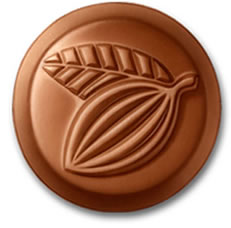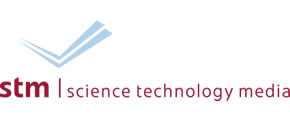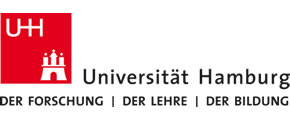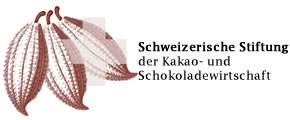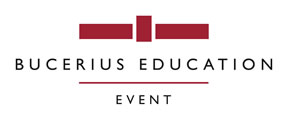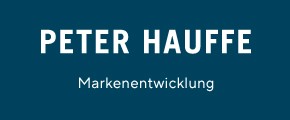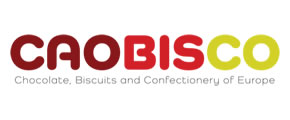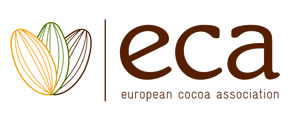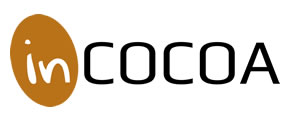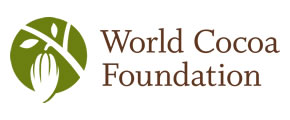June, 13 - 14 2024
Hamburg
Bucerius Law School (BLS)
News update 06/21/2024
The 11th Round Table Cocoa ended with a record number of participants. This time, 150 scientists and company representatives came to Hamburg, to discuss about planting systems, primary post-harvest processing and cocoa bean quality. One focus was on improving the exchange with farmers, with the aim of making existing scientific findings more widely applicable, in order to mitigate the impact of climate change. The latter was described as one of the central reasons for the crop failures in West Africa, which in turn contributed significantly to the sharp increase in cocoa prices. In this context, also the idea for a multi-stakeholder project, aiming at the selection of cacao trees with natural resistance to the central diseases Cocoa Swollen Shoot Virus, Black Pod, Frosty Pod, Witches Broom and Vascular Streak Dieback was presented and further developed. In the next step, the initiators will organize an international workshop with the support of CAOBISCO and ECA. We will keep you updated about the further planning through the Round Table website and also via email, if desired.
We would like to take the opportunity to thank you once again for the numerous participation in the Round Table Cocoa Hamburg 2024, which we are extremely pleased about.
The 12th Round Table Cocoa Hamburg is scheduled for 11 and 12 June 2026.
News update 06/07/2024
We have made some smaller updates in the program of the Round Table Cocoa. You can find the final version here.
News update 05/16/2024
Welcome to the 11th Round Table Cocoa on 13 and 14 June in Hamburg!
Cocoa Prices have seen a dramatic increase over the past months. During the introductory presentation we will look at the root causes of this development, amongst them shortages in the supply, and the reasons for the shortages. Throughout the program, the presenters will highlight, how research can contribute to avoid such shortages in the mid and long term. This contribution requires an improvement in the communication of research results to cocoa farmers, as highlighted during the International Symposium on Cocoa Research. Under the Round Table guiding theme “Empowering Knowledge Transfer”, our intention is to show up and discuss ways, at small and at large scale, how this communication improvement could be achieved.
Historically, like during all previous symposia, cocoa bean quality will self-evidently also be in the center of attention of the Round Table Cocoa 2024. Presentations will look at new insights about the impact of primary post-harvest processing techniques as well as of the cacao tree genetics on quality. Special emphasize will be put on the development of fruity aroma notes, as well as on off-flavors. Summarizing some of these findings, an AI-based approach to analyze flavor quality will be presented.
Finally, in the light of the planned introduction of maximum levels for MOAH, the speakers will address the progress of the Technical Working Group on MOH and propose a benchmark level for MOH in jute bags.
I am very much looking forward to welcoming you in Hamburg. Yours Sincerely,
Dr. Daniel Kadow
10th Round Table Cocoa
Food System Cocoa - Unravelling Key Drivers and their Impact on Cocoa Bean Quality.
We are more than glad that the Round Table Cocoa Hamburg - just in time for the jubilee symposium - could take place as attended event again. That also the participants were delighted about this opportunity was clearly noticeable. The discussion was more lively and multifaceted than ever before.
The program covered the entire processing chain, from cultivation and planting material over primary post-harvest processing, transportation, storage and cocoa bean quality up to chocolate and its versatile taste and aroma attributes. In line with the major theme, it could be highlighted multiple times how through the connection of the different research fields new insights into cocoa bean and chocolate quality can be obtained. Fully in the spirit of Aristoteles: „The whole is more than the sum of its parts.”
Under youtube.com/playlist you can now gain an impression of the 10th Round Table Cocoa Hamburg.
With my best Regards,
Dr. Daniel Kadow
Key topics
Representatives from leading universities are speaking in 2021 about current research topics. This years key topics are cocoa bean quality, post-harvest treatment and planting systems for the future.
Cocoa bean quality
- Taste-active substances and their precursors
- Aroma-active substances and their precursors
- Fine flavor substances
- Substances with off-flavor
- Cocoa sensory evaluation
- Cocoa butter attributes
- Traceability
- Changes in quality during transport and storage
- Contaminants
Primary post-harvest processing
- Fruit pulp biochemical changes during fermentation
- Microbial development during fermentation
- Microbial development during drying
- Starter cultures
- Cocoa bean biochemical changes during fermentation
- Cocoa bean biochemical changes during drying
- Cocoa bean / nib biochemical changes during roasting
- Off-flavor substance formation during fermentation and drying
Planting systems for the future
- Climate change resilient planting systems
- Cocoa genetic diversity
- Genetic impact on the sensory quality
- Multi-cropping and agroforestry systems
- Soil fertility management
- Disease prevention and monitoring
- Integrated crop protection
- Contaminants management
Impressions 2022
Speakers 2024
Representatives of leading universities and companies

Aldo Cristiano
Institution: School of the Environment, The University of Queensland, Australia
Empowering Knowledge Transfer – From research on planting systems, fermentation and cocoa bean quality to application by farmers and industry

Felix Christiansen
Institution: H.C.C.O Hanseatic Cocoa & Commodity Office GmbH Germany
The current cocoa price development - background, root cause analysis, outlook.

Dr. Wilma Hart
Institution: School of the Environment, The University of Queensland, Australia
Plantings Systems: Mapping cocoa agroforestry from space: using artificial intelligence to measure shade tree cover and carbon stocks, revealing the untapped potential of cocoa agroforestry for sustainable cocoa production in West Africa
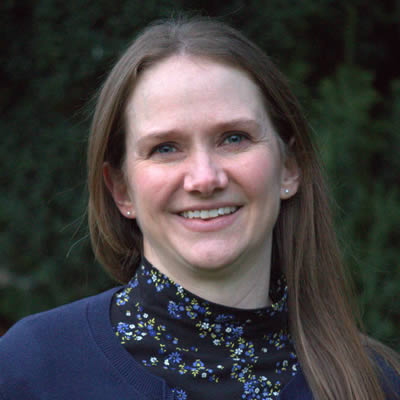
Dr. Andreanna Welch
Institution: Department of Biosciences, Durham University, United Kingdom
Plantings Systems: Cross-pollination in cocoa: exploring ecology, exchanging ideas - Working with farmers to identify and sustainably manage cocoa pollinators for increased yield

Dr. Sarah Arnold
Institution: National Institute of Agricultural Biology (NIAB), East Malling, United Kingdom
Plantings Systems: Cross-pollination in cocoa: exploring ecology, exchanging ideas - Working with farmers to identify and sustainably manage cocoa pollinators for increased yield
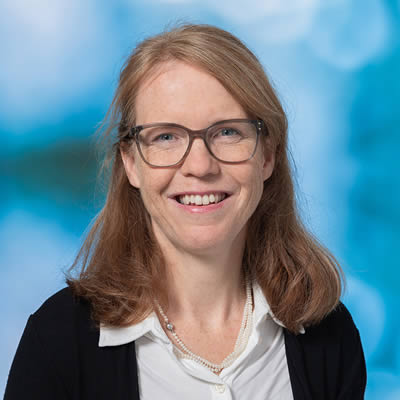
Prof. Dr. Susanne Miescher Schwenninger
Institution: Food Biotechnology, ZHAW School of Life Sciences and Facility Management, Switzerland
Fermentation: From standard fermentation to pod storage, predrying and depulping - An international comparison of fermentation methods and their impact on product quality
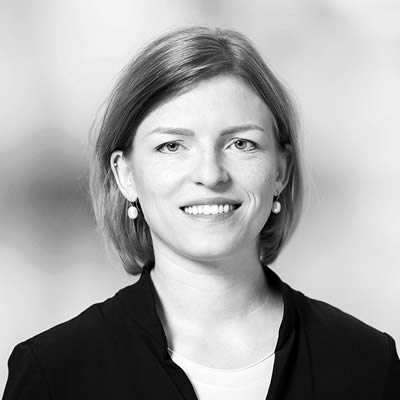
Dr. Stefanie Streule
Institution: Food Biotechnology, ZHAW School of Life Sciences and Facility Management, Switzerland
Fermentation: From standard fermentation to pod storage, predrying and depulping - An international comparison of fermentation methods and their impact on product quality
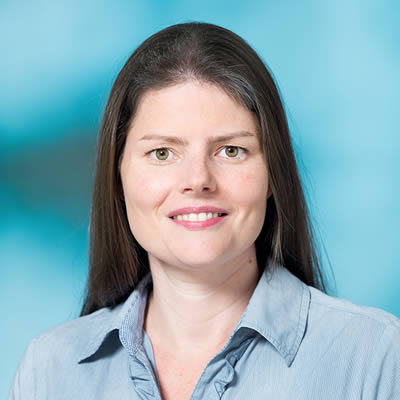
Dr. Susette Freimüller Leischtfeld
Institution: Food Biotechnology, ZHAW School of Life Sciences and Facility Management, Switzerland
Fermentation: From standard fermentation to pod storage, predrying and depulping - An international comparison of fermentation methods and their impact on product quality

Dr. Martin Steinhaus
Institution: Food Metabolome Chemistry Leibniz Institute for Food Systems Biology at the Technical University of Munich Germany
Impact of fermentation, drying and storage on the formation of important off-flavor compounds in cocoa

Michiel Kokken
Institution: Global Head of Regulatory and Scientific Affairs Cocoa, Ofi Netherlands
MOAH contamination in cocoa - Migration from jute bags, a proposal for a jute bag benchmark level and the correlation with unsaponifiables

Aleksandra Gorska
Institution: Chemistry for Sustainable Food and Environmental Systems University of Liège Belgium
MOAH contamination in cocoa - Migration from jute bags, a proposal for a jute bag benchmark level and the correlation with unsaponifiables

Barbora Tůmová
Institution: Research Institute of Organic Agriculture FiBL Switzerland
The fruits of cocoa agroforestry - Cacao Field Lab: participatory field research in the Peruvian Amazon

Severin Hellmüller
Institution: Project coordinator Choba Choba Foundation Switzerland
The fruits of cocoa agroforestry - Cacao Field Lab: participatory field research in the Peruvian Amazon
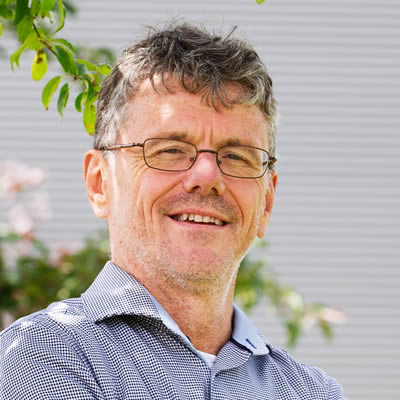
Prof. Dr. Niels Anten
Institution: Centre for Crop Systems Analysis, Wageningen University and Research, Netherlands
Plantings Systems: Sustainable cocoa production: an interplay of climate change, soil management and staying within current production areas

Dr. Thea Lautenschläger
Institution: Scientific Coordinator, Botanical Garden, University of Hamburg, Germany
Moniliophthora perniciosa in Angola, Africa - the first record in the Eastern Hemisphere

Dr. Rolando H. Cerda B.
Institution: Leader of the Unit: Agroforestry and Breeding of Coffee and Cacao, CATIE, Costa Rica
Cacao genetic resources and agroforestry experience of CATIE for productivity, pest management, and adaptation/mitigation

Dr. Carolina Ocampo Ariza
Institution: Agroecology Georg-August-University Göttingen Germany
Conserving and expanding cacao’s genetic diversity: Co-development of grafting strategies with cacao smallholder cooperatives towards sustainable growth in the production of native fine or flavor cacao.

Dr. Christian Bunn
Institution: Climate Action Alliance of Bioversity International and CIAT Colombia
ACLIMATAR - A climate adaptation planning tool for cocoa.
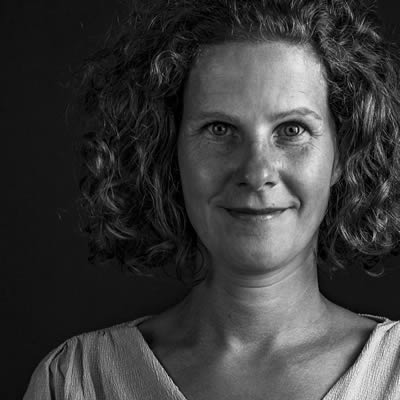
Dr. Christina Rohsius
Institution: Head of Department Cacao and Research, Rausch Management GmbH, Germany
Cocoa Bean Quality: "Fine or Flavour" cacao: origin, distribution and differentiation from "bulk cacao" - What influence do the variety, location parameters, degree of ripeness and post-harvest processes have?

Dr. Darin Sukha
Institution: Cocoa Research Centre The University of the West Indies Trinidad and Tobago
The Trinidad Cocoa Flavour Map: impact of genetics, microbiology and postharvest manipulation, captured through metagenomics, transcriptomics, proteomics and metabolomics, on sensomics in cacao

Dr. Andreas Dunkel
Institution: Integrative Food Systems Analysis Leibniz Institute for Food Systems Biology at the Technical University of Munich Germany
The Trinidad Cocoa Flavour Map: impact of genetics, microbiology and postharvest manipulation, captured through metagenomics, transcriptomics, proteomics and metabolomics, on sensomics in cacao

Prof. Dr. Erica Liberto
Institution: Food Chemistry University of Turin Italy
Flavour analysis 4.0 in cocoa industrial quality definition - Application of artificial Intelligence (AI) to flavour analysis, to improve the cocoa quality and support decision-making processes that contribute significantly to increasing efficiency, sustainability and competitiveness in the global cocoa market
Agenda
sessions, panel discussions
Empowering Knowledge Transfer – From research on planting systems, fermentation and cocoa bean quality to application by farmers and industry
Aldo Cristiano President of the German Cocoa and Chocolate Foundation; Dr. Daniel Kadow Program Director of the Round Table Cocoa Hamburg
Welcome to the 11th Round Table Cocoa Hamburg
The current cocoa price development - background, root cause analysis, outlook
Felix Christiansen H.C.C.O Hanseatic Cocoa & Commodity Office GmbH Germany
INTRODUCTION (Presentation 1)
Mapping cocoa agroforestry from space: using artificial intelligence to measure shade tree cover and carbon stocks, revealing the untapped potential of cocoa agroforestry for sustainable cocoa production in West Africa
Dr. Wilma Hart, School of the Environment, the University of Queensland, Australia
PLANTING SYSTEMS (Presentation 2)
Cross-pollination in cocoa: exploring ecology, exchanging ideas - Working with farmers to identify and sustainably manage cocoa pollinators for increased yield
Dr. Andreanna Welch, Department of Biosciences, Durham University, United Kingdom; Dr. Sarah Arnold, National Institute of Agricultural Biology (NIAB), East Malling, United Kingdom
PLANTING SYSTEMS (Presentation 3)
Posterslam Cocoa Bean Quality
Poster Exhibition Cocoa Bean Quality & Lunch break
From standard fermentation to pod storage, predrying and depulping - An international comparison of fermentation methods and their impact on product quality
Prof. Dr. Susanne Miescher Schwenninger, Dr. Stefanie Streule, Dr. Susette Freimüller Leischtfeld, Food Biotechnology, ZHAW School of Life Sciences and Facility Management, Switzerland
FERMENTATION & COCOA BEAN QUALITY (Presentation 4)
Impact of fermentation, drying and storage on the formation of important off-flavor compounds in cocoa: What are the crucial parameters?
Dr. Martin Steinhaus, Food Metabolome Chemistry, Leibniz Institute for Food Systems Biology at the Technical University of Munich, Germany
FERMENTATION & COCOA BEAN QUALITY (Presentation 5)
MOAH contamination in cocoa - Migration from jute bags, a proposal for a jute bag benchmark level and the correlation with unsaponifiables
Michiel Kokken, Global Head of Regulatory and Scientific Affairs Cocoa, Ofi, Netherlands; Aleksandra Gorska, Chemistry for Sustainable Food and Environmental Systems, University of Liège
COCOA BEAN QUALITY (Presentation 6)
Poster Exhibition Cocoa Bean Quality & Coffee break
The fruits of cocoa agroforestry - Cacao Field Lab: participatory field research in the Peruvian Amazon. Diversified agroforestry systems in cocoa produce a wide variety of exotics fruits, the experience from three demonstration plots in the Huayabamba Valley in Peru give insights into this diversity and the potential of agroecological production in the Amazon
Barbora Tůmová, Research Institute of Organic Agriculture FiBL, Switzerland; Severin Hellmüller, Project coordinator, Choba Choba Foundation
Evening Lecture
End of the First Day of the Symposium
Evening Event on the Cap San Diego
Round Table Dinner
Überseebrücke, 20459 Hamburg
Sustainable cocoa production: an interplay of climate change, soil management and staying within current production areas
Prof. Dr. Niels Anten, Centre for Crop Systems Analysis, Wageningen University and Research, Netherlands
PLANTING SYSTEMS (Presentation 7)
Conserving and expanding cacao’s genetic diversity: Co-development of grafting strategies with cacao smallholder cooperatives towards sustainable growth in the production of native fine or flavor cacao
Dr. Carolina Ocampo Ariza, Agroecology, Georg-August-University Göttingen, Germany
PLANTING SYSTEMS (Spotlight Presentation 1)
ACLIMATAR - A climate adaptation planning tool for cocoa
Dr. Christian Bunn, Climate Action, Alliance of Bioversity International and CIAT, Colombia
KNOWLEDGE TRANSFER (Spotlight Presentation 2) / And Podium Discussion: Empowering Knowledge Transfer
Sustainable Cocoa Production in West Africa
Prof. Dr. Niels Anten, Centre for Crop Systems Analysis, Wageningen University and Research, Netherlands
Moniliophthora perniciosa in Angola, Africa - the first record in the Eastern Hemisphere
Dr. Thea Lautenschläger, Scientific Coordinator, Botanical Garden, University of Hamburg, Germany
Research proposal for cacao disease resistances through testing worldwide genetic diversity
Alain Chevée, Polyplants, Lausanne, Switzerland
Cacao genetic resources and agroforestry experience of CATIE for productivity, pest management, and adaptation/mitigation
Dr. Rolando H. Cerda B., Leader of the Unit: Agroforestry and Breeding of Coffee and Cacao, CATIE, Costa Rica
Poster Exhibition Cocoa Bean Quality & Coffee Break
„Fine or Flavour“ cacao: origin, distribution and differentiation from “bulk cacao” - What influence do the variety, location parameters, degree of ripeness and postharvest processes have?
Dr. Christina Rohsius, Head of Department Cacao and Research, Rausch Management GmbH, Germanyuit pulp-based beverage
COCOA BEAN QUALITY (Presentation 8)
The Trinidad Cocoa Flavour Map: impact of genetics, microbiology and postharvest manipulation, captured through metagenomics, transcriptomics, proteomics and metabolomics, on sensomics in cacao (Theobroma cacao L.)
Dr. Darin Sukha, Cocoa Research Centre, The University of the West Indies, Trinidad and Tobago; Dr. Andreas Dunkel, Integrative Food Systems Analysis, Leibniz Institute for Food Systems Biology at the Technical University of Munich, Germany
COCOA BEAN QUALITY (Presentation 9)
Poster Exhibition Cocoa Bean Quality & Lunch Break
Flavour analysis 4.0 in cocoa industrial quality definition - Application of artificial Intelligence (AI) to flavour analysis, to improve the cocoa quality and support decision-making processes that contribute significantly to increasing efficiency, sustainability and competitiveness in the global cocoa market
Prof. Dr. Erica Liberto, Food Chemistry, University of Turin, Italy
COCOA BEAN QUALITY (Presentation 10)
Wrap up & Farewell
End of the symposium
The 12th Round Table Cocoa Hamburg will take place on 11th and 12th June 2026.
Testimonials
Runder Tisch Kakao
Networking platform
Meet the most important members of the international cocoa business.
Recent scientific progress
Get up to date about the recent German and international scientific cocoa projects
Main research topics in the future
Where will the journey lead us? Use the opportunity and discuss recent problems!
New research projects
Be part oft he process when new research projects are initiated!
Registration
The participation is free of charge.
We are happy to welcome you to register for the 11th Round Table Cocoa in Hamburg.
During the presentations a "virtual chocolate tasting" will take place. If you would like to participate in the tasting, we will send you the chocolate to an address of your choice. Please select the option "Chocolate Tasting" when registering.
Please fill in the order form
I
Participation on both days
Register for both days
Patronat and main sponsor
Strategic Partner
Interested in a sponsorship? Contact us!
Organizer & Event location
Founder
Prof. em. Dr. Reinhard Lieberei, Founder of the Round Table Cocoa Hamburg
Organizer
Dr. Daniel Kadow, August Storck KG, Organizer science and programme
Stephan Musiol (Fon: +49 175 - 560 66 18 & mail: musiol@sweetvision.de),
verlag stm, public relations
Event location
Bucerius Law School (BLS)
– Helmut Schmidt Auditorium –
Jungiusstraße 6
20355 Hamburg
Moderator
Dr. Daniel Kadow
Travel information
via airplain: Please use the Metroline S1 to Hamburg Mainstation and chang to S11/S31 to Hamburg Dammtor. The Bucerius Law School is only 500m from Dammtor.
via car: Driver please use the parking garage Messe-Ost
via train: If you travel via Hamburg Mainstation please use Metroline S11/S31 to Hamburg Dammtor.
Imprint
Privacy Policy
Site Notice
Dr. Daniel Kadow
Chausseestraße 56
10115 Berlin
Contact
Phone: +49 (0) 152 545 00 41
E-mail: daniel.kadow@rundertischkakao.de
Person responsible for editorial
Stephan Musiol
Jürgen-Töpfer-Straße 67
22763 Hamburg
EU dispute resolution
The European Commission provides a platform for online dispute resolution (ODR): https://ec.europa.eu/consumers/odr/.
Our e-mail address can be found above in the site notice.
Dispute resolution proceedings in front of a consumer arbitration board
We are not willing or obliged to participate in dispute resolution proceedings in front of a consumer arbitration board.
Privacy Policy
1. An overview of data protection
General information
The following information will provide you with an easy to navigate overview of what will happen with your personal data when you visit this website. The term “personal data” comprises all data that can be used to personally identify you. For detailed information about the subject matter of data protection, please consult our Data Protection Declaration, which we have included beneath this copy.
Data recording on this website
Who is the responsible party for the recording of data on this website (i.e., the “controller”)?
The data on this website is processed by the operator of the website, whose contact information is available under section “Information about the responsible party (referred to as the “controller” in the GDPR)” in this Privacy Policy.
How do we record your data?
We collect your data as a result of your sharing of your data with us. This may, for instance be information you enter into our contact form.
Other data shall be recorded by our IT systems automatically or after you consent to its recording during your website visit. This data comprises primarily technical information (e.g., web browser, operating system, or time the site was accessed). This information is recorded automatically when you access this website.
What are the purposes we use your data for?
A portion of the information is generated to guarantee the error free provision of the website. Other data may be used to analyze your user patterns.
What rights do you have as far as your information is concerned?
You have the right to receive information about the source, recipients, and purposes of your archived personal data at any time without having to pay a fee for such disclosures. You also have the right to demand that your data are rectified or eradicated. If you have consented to data processing, you have the option to revoke this consent at any time, which shall affect all future data processing. Moreover, you have the right to demand that the processing of your data be restricted under certain circumstances. Furthermore, you have the right to log a complaint with the competent supervising agency.
Please do not hesitate to contact us at any time if you have questions about this or any other data protection related issues.
2. Hosting
We are hosting the content of our website at the following provider:
External Hosting
This website is hosted externally. Personal data collected on this website are stored on the servers of the host. These may include, but are not limited to, IP addresses, contact requests, metadata and communications, contract information, contact information, names, web page access, and other data generated through a web site.
The external hosting serves the purpose of fulfilling the contract with our potential and existing customers (Art. 6(1)(b) GDPR) and in the interest of secure, fast, and efficient provision of our online services by a professional provider (Art. 6(1)(f) GDPR). If appropriate consent has been obtained, the processing is carried out exclusively on the basis of Art. 6 (1)(a) GDPR and § 25 (1) TDDDG, insofar the consent includes the storage of cookies or the access to information in the user's end device (e.g., device fingerprinting) within the meaning of the TDDDG. This consent can be revoked at any time.
Our host(s) will only process your data to the extent necessary to fulfil its performance obligations and to follow our instructions with respect to such data.
We are using the following host(s):
Hetzner Online GmbH
Industriestr. 25
91710 Gunzenhausen
PROJEKT 77
Obdrupstraße 15
24986 Mittelangeln
Data processing
We have concluded a data processing agreement (DPA) for the use of the above-mentioned service. This is a contract mandated by data privacy laws that guarantees that they process personal data of our website visitors only based on our instructions and in compliance with the GDPR.
3. General information and mandatory information
Data protection
The operators of this website and its pages take the protection of your personal data very seriously. Hence, we handle your personal data as confidential information and in compliance with the statutory data protection regulations and this Data Protection Declaration.
Whenever you use this website, a variety of personal information will be collected. Personal data comprises data that can be used to personally identify you. This Data Protection Declaration explains which data we collect as well as the purposes we use this data for. It also explains how, and for which purpose the information is collected.
We herewith advise you that the transmission of data via the Internet (i.e., through e-mail communications) may be prone to security gaps. It is not possible to completely protect data against third-party access.
Information about the responsible party (referred to as the “controller” in the GDPR)
The data processing controller on this website is:
Dr. Daniel Kadow
Chausseestraße 56
D-10115 Berlin
Phone: +49 (0) 152 545 00 41
E-mail: daniel.kadow@rundertischkakao.de
The controller is the natural person or legal entity that single-handedly or jointly with others makes decisions as to the purposes of and resources for the processing of personal data (e.g., names, e-mail addresses, etc.).
Storage duration
Unless a more specific storage period has been specified in this privacy policy, your personal data will remain with us until the purpose for which it was collected no longer applies. If you assert a justified request for deletion or revoke your consent to data processing, your data will be deleted, unless we have other legally permissible reasons for storing your personal data (e.g., tax or commercial law retention periods); in the latter case, the deletion will take place after these reasons cease to apply.
General information on the legal basis for the data processing on this website
If you have consented to data processing, we process your personal data on the basis of Art. 6(1)(a) GDPR or Art. 9 (2)(a) GDPR, if special categories of data are processed according to Art. 9 (1) DSGVO. In the case of explicit consent to the transfer of personal data to third countries, the data processing is also based on Art. 49 (1)(a) GDPR. If you have consented to the storage of cookies or to the access to information in your end device (e.g., via device fingerprinting), the data processing is additionally based on § 25 (1) TDDDG. The consent can be revoked at any time. If your data is required for the fulfillment of a contract or for the implementation of pre-contractual measures, we process your data on the basis of Art. 6(1)(b) GDPR. Furthermore, if your data is required for the fulfillment of a legal obligation, we process it on the basis of Art. 6(1)(c) GDPR. Furthermore, the data processing may be carried out on the basis of our legitimate interest according to Art. 6(1)(f) GDPR. Information on the relevant legal basis in each individual case is provided in the following paragraphs of this privacy policy.
Recipients of personal data
In the scope of our business activities, we cooperate with various external parties. In some cases, this also requires the transfer of personal data to these external parties. We only disclose personal data to external parties if this is required as part of the fulfillment of a contract, if we are legally obligated to do so (e.g., disclosure of data to tax authorities), if we have a legitimate interest in the disclosure pursuant to Art. 6 (1)(f) GDPR, or if another legal basis permits the disclosure of this data. When using processors, we only disclose personal data of our customers on the basis of a valid contract on data processing. In the case of joint processing, a joint processing agreement is concluded.
Revocation of your consent to the processing of data
A wide range of data processing transactions are possible only subject to your express consent. You can also revoke at any time any consent you have already given us. This shall be without prejudice to the lawfulness of any data collection that occurred prior to your revocation.
Right to object to the collection of data in special cases; right to object to direct advertising (Art. 21 GDPR)
IN THE EVENT THAT DATA ARE PROCESSED ON THE BASIS OF ART. 6(1)(E) OR (F) GDPR, YOU HAVE THE RIGHT TO AT ANY TIME OBJECT TO THE PROCESSING OF YOUR PERSONAL DATA BASED ON GROUNDS ARISING FROM YOUR UNIQUE SITUATION. THIS ALSO APPLIES TO ANY PROFILING BASED ON THESE PROVISIONS. TO DETERMINE THE LEGAL BASIS, ON WHICH ANY PROCESSING OF DATA IS BASED, PLEASE CONSULT THIS DATA PROTECTION DECLARATION. IF YOU LOG AN OBJECTION, WE WILL NO LONGER PROCESS YOUR AFFECTED PERSONAL DATA, UNLESS WE ARE IN A POSITION TO PRESENT COMPELLING PROTECTION WORTHY GROUNDS FOR THE PROCESSING OF YOUR DATA, THAT OUTWEIGH YOUR INTERESTS, RIGHTS AND FREEDOMS OR IF THE PURPOSE OF THE PROCESSING IS THE CLAIMING, EXERCISING OR DEFENCE OF LEGAL ENTITLEMENTS (OBJECTION PURSUANT TO ART. 21(1) GDPR).
IF YOUR PERSONAL DATA IS BEING PROCESSED IN ORDER TO ENGAGE IN DIRECT ADVERTISING, YOU HAVE THE RIGHT TO OBJECT TO THE PROCESSING OF YOUR AFFECTED PERSONAL DATA FOR THE PURPOSES OF SUCH ADVERTISING AT ANY TIME. THIS ALSO APPLIES TO PROFILING TO THE EXTENT THAT IT IS AFFILIATED WITH SUCH DIRECT ADVERTISING. IF YOU OBJECT, YOUR PERSONAL DATA WILL SUBSEQUENTLY NO LONGER BE USED FOR DIRECT ADVERTISING PURPOSES (OBJECTION PURSUANT TO ART. 21(2) GDPR).
Right to log a complaint with the competent supervisory agency
In the event of violations of the GDPR, data subjects are entitled to log a complaint with a supervisory agency, in particular in the member state where they usually maintain their domicile, place of work or at the place where the alleged violation occurred. The right to log a complaint is in effect regardless of any other administrative or court proceedings available as legal recourses.
Right to data portability
You have the right to have data that we process automatically on the basis of your consent or in fulfillment of a contract handed over to you or to a third party in a common, machine-readable format. If you should demand the direct transfer of the data to another controller, this will be done only if it is technically feasible.
Information about, rectification and eradication of data
Within the scope of the applicable statutory provisions, you have the right to demand information about your archived personal data, their source and recipients as well as the purpose of the processing of your data at any time. You may also have a right to have your data rectified or eradicated. If you have questions about this subject matter or any other questions about personal data, please do not hesitate to contact us at any time.
Right to demand processing restrictions
You have the right to demand the imposition of restrictions as far as the processing of your personal data is concerned. To do so, you may contact us at any time. The right to demand restriction of processing applies in the following cases:
- In the event that you should dispute the correctness of your data archived by us, we will usually need some time to verify this claim. During the time that this investigation is ongoing, you have the right to demand that we restrict the processing of your personal data.
- If the processing of your personal data was/is conducted in an unlawful manner, you have the option to demand the restriction of the processing of your data instead of demanding the eradication of this data.
- If we do not need your personal data any longer and you need it to exercise, defend or claim legal entitlements, you have the right to demand the restriction of the processing of your personal data instead of its eradication.
- If you have raised an objection pursuant to Art. 21(1) GDPR, your rights and our rights will have to be weighed against each other. As long as it has not been determined whose interests prevail, you have the right to demand a restriction of the processing of your personal data.
If you have restricted the processing of your personal data, these data – with the exception of their archiving – may be processed only subject to your consent or to claim, exercise or defend legal entitlements or to protect the rights of other natural persons or legal entities or for important public interest reasons cited by the European Union or a member state of the EU.
SSL and/or TLS encryption
For security reasons and to protect the transmission of confidential content, such as purchase orders or inquiries you submit to us as the website operator, this website uses either an SSL or a TLS encryption program. You can recognize an encrypted connection by checking whether the address line of the browser switches from “http://” to “https://” and also by the appearance of the lock icon in the browser line.
If the SSL or TLS encryption is activated, data you transmit to us cannot be read by third parties.
Rejection of unsolicited e-mails
We herewith object to the use of contact information published in conjunction with the mandatory information to be provided in our Site Notice to send us promotional and information material that we have not expressly requested. The operators of this website and its pages reserve the express right to take legal action in the event of the unsolicited sending of promotional information, for instance via SPAM messages.
4. Recording of data on this website
Cookies
Our websites and pages use what the industry refers to as “cookies.” Cookies are small data packages that do not cause any damage to your device. They are either stored temporarily for the duration of a session (session cookies) or they are permanently archived on your device (permanent cookies). Session cookies are automatically deleted once you terminate your visit. Permanent cookies remain archived on your device until you actively delete them, or they are automatically eradicated by your web browser.
Cookies can be issued by us (first-party cookies) or by third-party companies (so-called third-party cookies). Third-party cookies enable the integration of certain services of third-party companies into websites (e.g., cookies for handling payment services).
Cookies have a variety of functions. Many cookies are technically essential since certain website functions would not work in the absence of these cookies (e.g., the shopping cart function or the display of videos). Other cookies may be used to analyze user behavior or for promotional purposes.
Cookies, which are required for the performance of electronic communication transactions, for the provision of certain functions you want to use (e.g., for the shopping cart function) or those that are necessary for the optimization (required cookies) of the website (e.g., cookies that provide measurable insights into the web audience), shall be stored on the basis of Art. 6(1)(f) GDPR, unless a different legal basis is cited. The operator of the website has a legitimate interest in the storage of required cookies to ensure the technically error-free and optimized provision of the operator’s services. If your consent to the storage of the cookies and similar recognition technologies has been requested, the processing occurs exclusively on the basis of the consent obtained (Art. 6(1)(a) GDPR and § 25 (1) TDDDG); this consent may be revoked at any time.
You have the option to set up your browser in such a manner that you will be notified any time cookies are placed and to permit the acceptance of cookies only in specific cases. You may also exclude the acceptance of cookies in certain cases or in general or activate the delete-function for the automatic eradication of cookies when the browser closes. If cookies are deactivated, the functions of this website may be limited.
Which cookies and services are used on this website can be found in this privacy policy.
Server log files
The provider of this website and its pages automatically collects and stores information in so-called server log files, which your browser communicates to us automatically. The information comprises:
- The type and version of browser used
- The used operating system
- Referrer URL
- The hostname of the accessing computer
- The time of the server inquiry
- The IP address
This data is not merged with other data sources.
This data is recorded on the basis of Art. 6(1)(f) GDPR. The operator of the website has a legitimate interest in the technically error free depiction and the optimization of the operator’s website. In order to achieve this, server log files must be recorded.
Contact form
If you submit inquiries to us via our contact form, the information provided in the contact form as well as any contact information provided therein will be stored by us in order to handle your inquiry and in the event that we have further questions. We will not share this information without your consent.
The processing of these data is based on Art. 6(1)(b) GDPR, if your request is related to the execution of a contract or if it is necessary to carry out pre-contractual measures. In all other cases the processing is based on our legitimate interest in the effective processing of the requests addressed to us (Art. 6(1)(f) GDPR) or on your agreement (Art. 6(1)(a) GDPR) if this has been requested; the consent can be revoked at any time.
The information you have entered into the contact form shall remain with us until you ask us to eradicate the data, revoke your consent to the archiving of data or if the purpose for which the information is being archived no longer exists (e.g., after we have concluded our response to your inquiry). This shall be without prejudice to any mandatory legal provisions, in particular retention periods.
Request by e-mail, telephone, or fax
If you contact us by e-mail, telephone or fax, your request, including all resulting personal data (name, request) will be stored and processed by us for the purpose of processing your request. We do not pass these data on without your consent.
These data are processed on the basis of Art. 6(1)(b) GDPR if your inquiry is related to the fulfillment of a contract or is required for the performance of pre-contractual measures. In all other cases, the data are processed on the basis of our legitimate interest in the effective handling of inquiries submitted to us (Art. 6(1)(f) GDPR) or on the basis of your consent (Art. 6(1)(a) GDPR) if it has been obtained; the consent can be revoked at any time.
The data sent by you to us via contact requests remain with us until you request us to delete, revoke your consent to the storage or the purpose for the data storage lapses (e.g. after completion of your request). Mandatory statutory provisions - in particular statutory retention periods - remain unaffected.
5. Plug-ins and Tools
Google Fonts
To ensure that fonts used on this website are uniform, this website uses so-called Google Fonts provided by Google. When you access a page on our website, your browser will load the required fonts into your browser cache to correctly display text and fonts.
To do this, the browser you use will have to establish a connection with Google’s servers. As a result, Google will learn that your IP address was used to access this website. The use of Google Fonts is based on Art. 6(1)(f) GDPR. The website operator has a legitimate interest in a uniform presentation of the font on the operator’s website. If appropriate consent has been obtained, the processing is carried out exclusively on the basis of Art. 6(1)(a) GDPR and § 25 (1) TDDDG, insofar the consent includes the storage of cookies or the access to information in the user’s end device (e.g., device fingerprinting) within the meaning of the TDDDG. This consent can be revoked at any time.
If your browser should not support Google Fonts, a standard font installed on your computer will be used.
For more information on Google Fonts, please follow this link: https://developers.google.com/fonts/faq and consult Google’s Data Privacy Declaration under: https://policies.google.com/privacy?hl=en.
The company is certified in accordance with the “EU-US Data Privacy Framework” (DPF). The DPF is an agreement between the European Union and the US, which is intended to ensure compliance with European data protection standards for data processing in the US. Every company certified under the DPF is obliged to comply with these data protection standards. For more information, please contact the provider under the following link: https://www.dataprivacyframework.gov/s/participant-search/participant-detail?contact=true&id=a2zt000000001L5AAI&status=Active
Font Awesome (local embedding)
This website uses Font Awesome to ensure the uniform use of fonts on this site. Font Awesome is locally installed so that a connection to Fonticons, Inc.’s servers will not be established in conjunction with this application.
For more information on Font Awesome, please and consult the Data Privacy Declaration for Font Awesome under: https://fontawesome.com/privacy.
6. eCommerce and payment service providers
Processing of Customer and Contract Data
We collect, process, and use personal customer and contract data for the establishment, content arrangement and modification of our contractual relationships. Data with personal references to the use of this website (usage data) will be collected, processed, and used only if this is necessary to enable the user to use our services or required for billing purposes. The legal basis for these processes is Art. 6(1)(b) GDPR.
The collected customer data shall be deleted upon completion of the order or termination of the business relationship and upon expiration of any existing statutory archiving periods. This shall be without prejudice to any statutory archiving periods.

